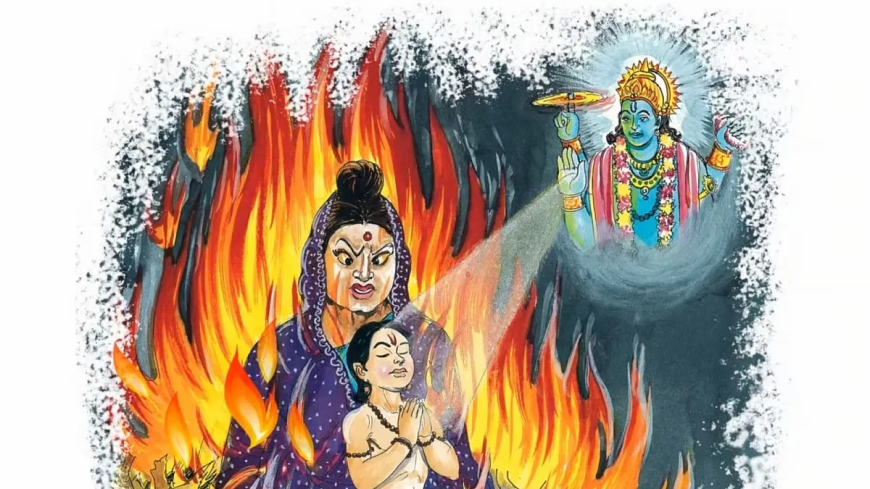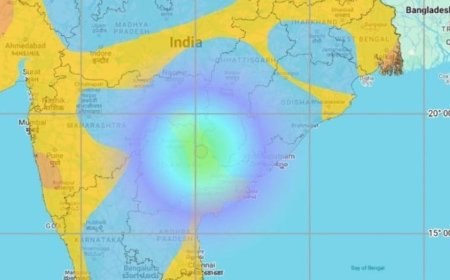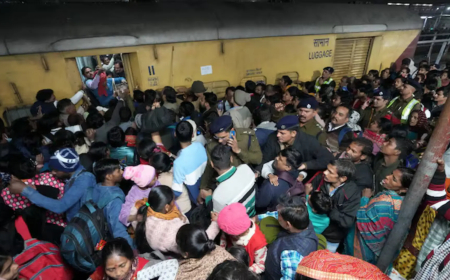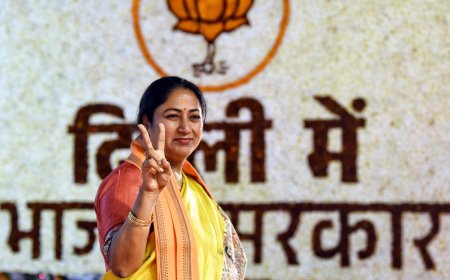Women Honored Holika in Bhusavar: Observed Fast, Listened to Divine Tales, and Prayed for a Life Free from Negativity
The vibrant festival of Holika Dahan was celebrated with great devotion and enthusiasm in Bhusavar, where women participated in religious rituals to seek divine blessings. They observed fasts, engaged in prayers, and listened to sacred stories, hoping to remove negativity from their lives and invite peace and happiness. This traditional worship, deeply rooted in Hindu culture, reflects the timeless belief in good triumphing over evil.
Let’s explore the significance of this observance, the customs followed by women, and the spiritual impact of their devotion.
The Significance of Worshipping Holika
Holika Dahan, celebrated a day before Holi, symbolizes the victory of good over evil. It originates from the ancient tale of Prahlad and his devotion to Lord Vishnu. His evil aunt, Holika, who had a boon of being immune to fire, tried to harm him, but divine intervention led to her downfall. This event is remembered every year through a ritualistic bonfire, where people pray to eliminate negativity from their lives.
Women play a crucial role in this tradition by offering prayers and performing sacred rituals. In Bhusavar, this year’s Holika worship saw a remarkable turnout, where women expressed their faith through fasting and storytelling.
Women’s Participation in the Rituals
1. Observing Fast with Devotion
- Women in Bhusavar observed a special fast dedicated to Holika.
- Fasting is believed to purify the mind and body while strengthening one’s connection with the divine.
- Many women abstained from consuming food and survived on fruits and water throughout the day.
2. Performing Holika Puja
- Women gathered around the sacred Holika bonfire and offered their prayers.
- The puja included offering turmeric, coconut, grains, and sweets to seek divine blessings.
- Some women also tied sacred threads around the Holika bonfire as a symbol of protection from evil forces.
3. Listening to Mythological Stories
- Listening to the story of Prahlad, Holika, and Lord Vishnu is an essential part of the ritual.
- Women in Bhusavar sat together and recited these stories to remember the power of faith and devotion.
- These narratives inspire individuals to stand against injustice and believe in the protection of divine forces.
4. Seeking Blessings for a Better Life
- Prayers were offered not just for personal well-being but also for family harmony and prosperity.
- Women wished for protection against negative influences and prayed for happiness and health.
- Many devotees also prayed for the strength to overcome challenges and adversities in life.
Spiritual and Cultural Impact of the Worship
1. Spreading Positivity and Unity
- The gathering of women created a strong sense of community and unity.
- Collective prayers enhance spiritual energy, fostering an environment of peace and positivity.
- The celebration reinforced the importance of traditional values and mutual support.
2. Strengthening Faith and Devotion
- Fasting and worship deepen faith and create a sense of inner peace.
- Women believe that devotion to Holika brings them divine protection from evil energies.
- Spiritual practices remind individuals of the importance of righteousness and truth.
3. Teaching the Next Generation
- Many elderly women took the opportunity to teach young girls about the traditions of Holika Dahan.
- The younger generation actively participated, ensuring that cultural values are passed down.
- The storytelling sessions helped children understand the moral values associated with the festival.
Customs and Rituals Followed in Bhusavar’s Holika Worship
Every region in India has its own unique customs when it comes to Holika Puja. In Bhusavar, women followed specific rituals that added a distinctive cultural touch to the celebration.
1. Offering Grains to the Holy Fire
- As per tradition, women offered grains and pulses into the Holika bonfire.
- This ritual signifies gratitude towards nature and prayers for a bountiful harvest.
2. Applying Turmeric and Vermilion
- Women applied turmeric and vermilion to each other as a gesture of blessings and good fortune.
- It is believed that these substances bring positivity and prosperity.
3. Singing Traditional Devotional Songs
- The celebration was accompanied by the singing of bhajans (devotional songs).
- These songs express gratitude towards the divine and fill the atmosphere with spiritual energy.
The Power of Prayer: Seeking Freedom from Negativity
One of the core aspects of the Holika worship in Bhusavar was the heartfelt prayers for a life free from negativity.
1. Praying for Protection
- Women sought divine protection for themselves and their families.
- They prayed for a life free from evil influences and harmful energies.
2. Wishing for Happiness and Prosperity
- Devotees asked for joy, peace, and good fortune in their lives.
- Many women also prayed for their children’s success and well-being.
3. Strengthening Spiritual Connection
- Through fasting and worship, women felt a deeper connection with God.
- The entire experience reinforced their faith and devotion.
Conclusion: A Celebration of Faith and Tradition
The worship of Holika in Bhusavar was more than just a religious event; it was a reflection of deep-rooted faith, unity, and cultural heritage. By fasting, offering prayers, and listening to divine stories, women embraced the true essence of Holika Dahan—victory of good over evil.
This beautiful tradition continues to inspire countless individuals to lead a righteous life filled with positivity and devotion. The observance not only strengthens faith but also brings families and communities together in a spirit of harmony and togetherness.
As the festival of Holi follows, the devotion shown by these women adds a meaningful beginning to the celebrations, reminding everyone of the importance of faith, hope, and the everlasting triumph of good.






























































![[LIVE] Karunya KR 702 Lottery Result for April 19, 2025 Announced: Check Saturday’s Lucky Numbers Here](https://24searchnews.com/uploads/images/202504/image_430x256_6803966b73521.jpg)








